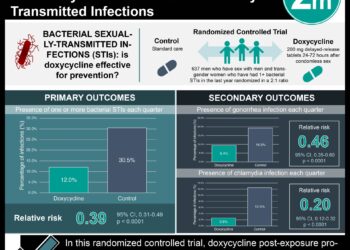Patient Basics: Chlamydia
Originally published by Harvard Health.
What Is It?
Chlamydia is a sexually transmitted infection spread by having unprotected sex with someone infected with bacteria called Chlamydia trachomatis. These bacteria are found in the urine and genital secretions of infected people. Chlamydia can affect several areas of the reproductive system, causing urethritis, vaginitis, cervicitis and pelvic inflammatory disease (PID). Chlamydia also can cause eye infections and pneumonia in newborns delivered by mothers who have chlamydia.
Chlamydia is one of the most common sexually transmitted infections. Infections occur most often in unmarried people under age 25 who have had two or more sex partners during the previous year. In women, chlamydia that is not treated can lead to infertility, chronic pelvic pain and tubal pregnancy, in which the fertilized egg implants and grows in the fallopian tube, rather than the uterus.
Symptoms
About 75% of women and 50% of men with chlamydia have no symptoms. This is why many infected people remain untreated and can continue to spread the infection to others.
In women, chlamydia can cause:
- A burning sensation when urinating
- An abnormal vaginal discharge
- Light vaginal bleeding (especially after intercourse)
- Pain in the pelvis or lower abdomen
In men, chlamydia can cause:
- An abnormal release of fluid that is not urine or semen (called penile discharge)
- A burning sensation when urinating
Diagnosis
Because chlamydia may not cause any symptoms, your doctor will gauge your risk of having the infection based on your sexual history. For example, your doctor will ask if you have had sex without using condoms. Your doctor can confirm whether you have chlamydia by using a urine test or a swab to collect fluid from the urethra or cervix. If you are at risk of chlamydia, you should be tested at least once a year, even if you have no symptoms.
Expected Duration
If untreated, chlamydia can last for many months, and during this time, bacteria can be spread to others through unprotected sex.
Prevention
Because chlamydia is a disease that can be spread during sexual intercourse, you can prevent chlamydia by:
- Not having sex
- Having sex with only one, uninfected person
- Always using male latex condoms during sexual activity
To prevent complications of untreated chlamydia, including infertility and tubal pregnancy, sexually active women at risk of chlamydia should have a routine pelvic examination with a chlamydia-screening test every year. To prevent chlamydia eye infections and pneumonia in newborns, pregnant women at risk of chlamydia should be screened.
Treatment
Doctors treat chlamydia with oral antibiotics such as doxycycline (Vibramycin), azithromycin (Zithromax) and ofloxacin (Floxin). Everyone being treated for chlamydia should have all of his or her sex partners treated as well.
When To Call A Professional
The United States Preventive Services Task Force strongly recommends the following groups of women receive yearly Chlamydia screening:
- Sexually active women age 24 and younger
- Older women with multiple sex partners
- All pregnant women age 24 and younger
- Older pregnant women who may be at higher risk
Call your health care professional if you have had sexual contact with someone you think has been infected with chlamydia.
Call your doctor if you have symptoms of urethral, vaginal or pelvic infection.
Prognosis
Antibiotic treatment cures chlamydia and can usually prevent complications. Once a woman develops pelvic inflammatory disease from chlamydia or another cause, she has up to 20% risk of a long-term complication such as infertility or chronic pelvic pain.
Additional Info
American Social Health Association
P.O. Box 13827
Research Triangle Park, NC 27709-3827
Phone: (919) 361-8400
http://www.ashastd.org/
CDC National Prevention Information Network (NPIN)
National Center for HIV, STD and TB Prevention
P.O. Box 6003
Rockville, MD 20849-6003
Toll-Free: (800) 458-5231
Fax: (888) 282-7681
TTY: (800) 243-7012
http://www.cdcnpin.org/








